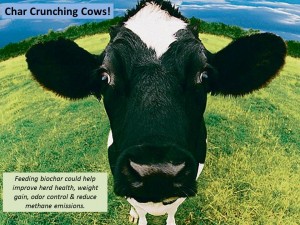Recently I spoke with a local organic dairy farmer that is interested in testing biochar as a component of the total mixed rations (TMR) that she feeds her lactating ladies. I learned a lot in speaking with her and this got me started ruminating about some recent biochar research that has caused quite a stir in the biochar community (check it out here)
According to this study adding small amounts of biochar to livestock feed can lead to increased feed conversion rates (cows get fatter on less food), but it can also lead to substantial methane (CH4) emission reductions. Bovines are notorious sources for CH4 which has recently been found to be even MORE lethal to climate change than had been previously thought. (When this topic comes up at your next dinner party, make sure to make everyone aware that you know that these bovine emissions mostly come the front end of the cow and not the other end, as is commonly believed!) Since CH4 only hangs out in the atmosphere for a few decades, reducing it could really help mitigate global warming potential. While I would think most of us would like to see these cow related emission rates reduced, an entrepreneurial bunch of Argentine scientists have figured out an ingenious, if rather unwieldy way to convert the CH4 into something useful. I can’t quite picture cows sporting these gadgets …but I think I may be digressing.
The main point here is that cows emit methane. Lots of methane. Up to 300 liters every day per cow! Some of that is attributable to the diet that we humans make them eat which is often a far cry from their traditional diet. This has the unfortunate side effect of upsetting all four of their delicate tummies and so they have gas which needs to be gotten rid of! And according to this study biochar, kind of like an antacid, helps calm the tummies and reduce the gas (that is my non-scientific interpretation!).
All of this is all well and good EXCEPT that that benefit on its own, is not going to get farmers to dash out and buy biochar since we don’t currently have any kind of incentive to reduce methane no matter the source (i.e. fracking is another BIG source). The other benefit, more efficient weight gain, is far more compelling at least for certain livestock populations (I can’t say too many women would want to take it for that reason though!).
Weight gain for a dairy herd is really only important for the first two years of life for replacement heifers (young lady cows). After that, they try to maintain their girlish figures for the most part. So for dairy cows and brood cows in the beef world, the efficient weight gain angle probably won’t work. There are indications of other positive impacts that I’ll get into in future posts which could still make adding biochar to feed for dairy worthwhile from an economic perspective. I would imagine those livestock farmers that would be most interested in the improved feed conversion aspect would be those that are finishing steers into burgers, those raising hogs or those in the meat poultry world.
Tons more research is needed but I’d like to see if by adding biochar, farmers could eliminate bentonite clay or sodium bicarbonate (think baking soda) or probiotics from the TMR thereby offsetting the cost of biochar. I’m still learning about the costs and environmental impacts of these products as well as all of the benefits they are supposed to provide to see how biochar stacks up as an alternative.
If you have any ruminations of your own on this topic, please share!


